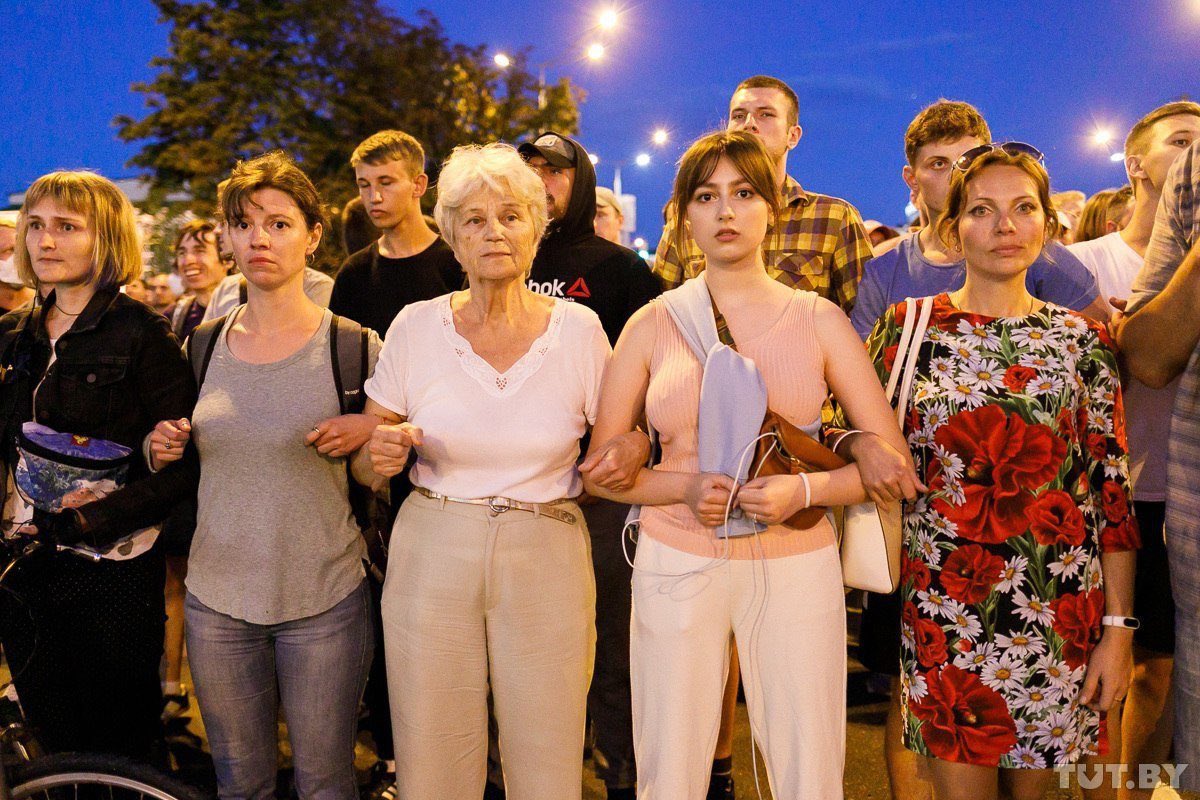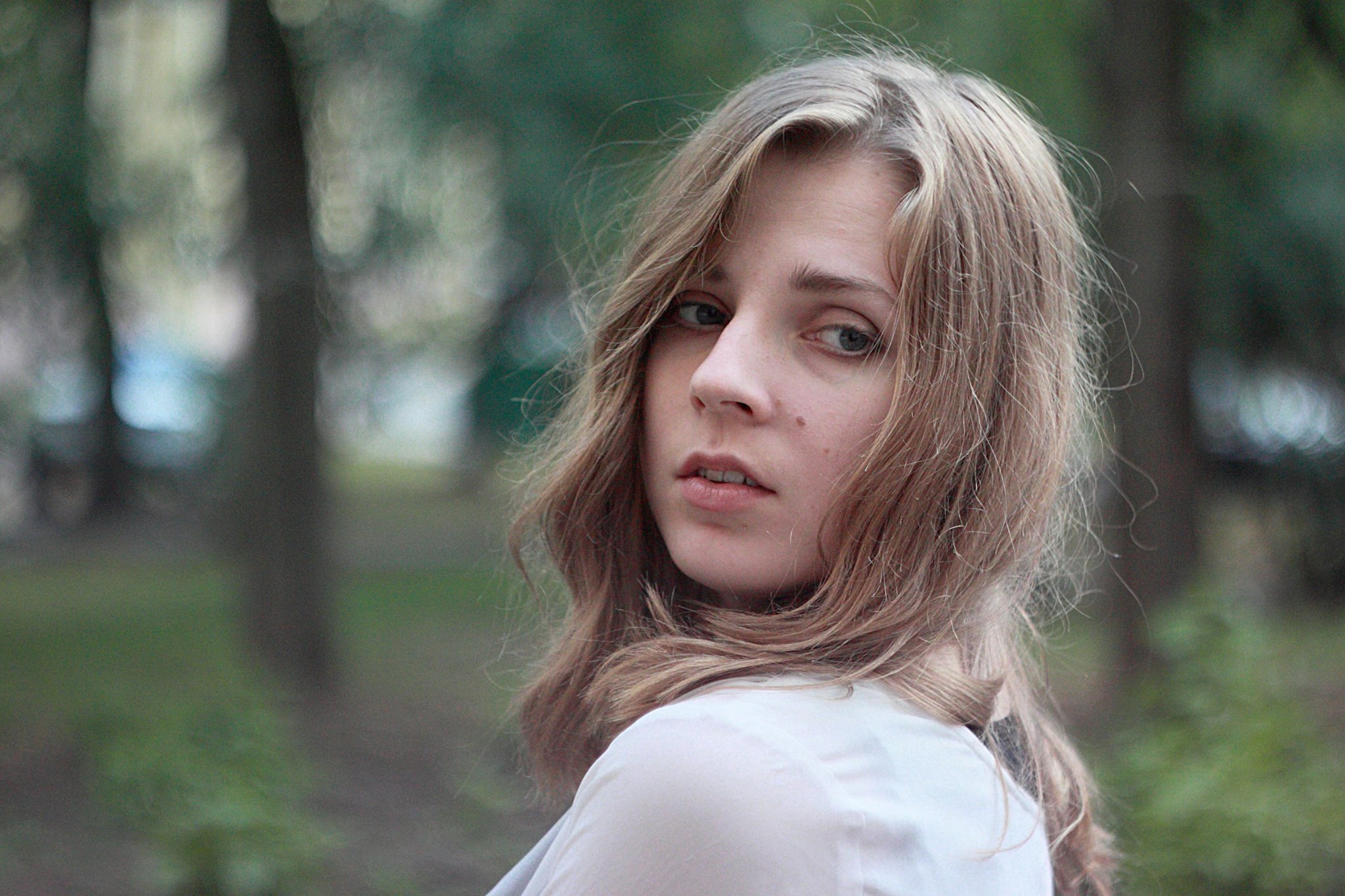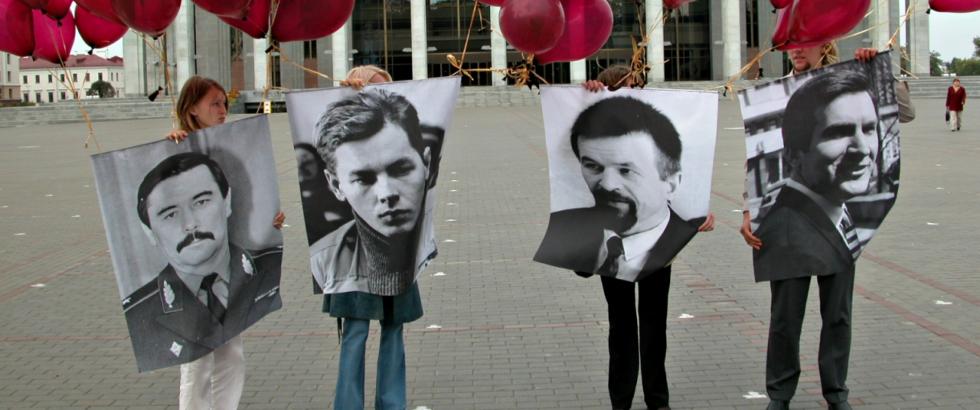Belarusian poet, activist, former president, and board member of Belarusian PEN Andrei Khadanovich explains.
 Andrei Khadanovich is a Belarusian poet, translator, literary historian, and former president of the Belarusian faction of the PEN Center (2009-2017), a global human rights association, and the first international writers association. He teaches at the Belarusian State University and the Yakub Kolas Belarusian Humanitarian Lyceum, both in Minsk. He translates works into Belarusian, from French, Ukrainian, and Polish, and is a laureate of the Zbigniew Dominyaka Prize for translations of Polish poetry into Belarusian. Euromaidan Press conducted an interview with him in Belarusian and the abbreviated English translation follows.
Andrei Khadanovich is a Belarusian poet, translator, literary historian, and former president of the Belarusian faction of the PEN Center (2009-2017), a global human rights association, and the first international writers association. He teaches at the Belarusian State University and the Yakub Kolas Belarusian Humanitarian Lyceum, both in Minsk. He translates works into Belarusian, from French, Ukrainian, and Polish, and is a laureate of the Zbigniew Dominyaka Prize for translations of Polish poetry into Belarusian. Euromaidan Press conducted an interview with him in Belarusian and the abbreviated English translation follows.What Belarusians fear
B.B.: How can you live and create in such conditions, when authorities can stop a passenger flight and arrest someone like the journalist Roman Protasevich. Aren’t you afraid they might come for you tomorrow?
To be honest, I assume such a possibility. I spoke in interviews a lot, signed public statements, performed during our street protests every day with songs and poems. All this may well make for a sentence under Belarusian criminal law. But in the past months and especially days, even these cynical and harsh criminal rules have disappeared. Now there is a legal deficit — lawlessness. Only the Russian pejorative word bespredel (complete lawlessness – Ed.) fits this situation.
It is a bit scary, but more horrifying is another thing. I have no doubt that everything will end well. And it would be terrible to understand, looking back and remembering ourselves, that you could have said something else, but kept silent, could have done something, but did not. I have this fear – to find out that I just stood aside.It would be terrible to understand that you could have said something else, but kept silent, could have done something, but did not. I have this fear – to find out that I just stood aside.
As a person who writes something, translates something, sings a little, I use this tool … It’s very difficult to distinguish now where I am an artist and where I am a person. Everything human hurts us … That means at least a million active people in Belarus now and they all feel pain.
Powerful scenes in #Belarus tonight: at Kurapaty, a Stalin-era execution site near Minsk, Belarusians commemorate the 1937 NKVD killings of the country's cultural elite. In this video, Andrei Khadanovich performs "Mury" (Walls), one of the anthems of current democratic protests. pic.twitter.com/25R6g4CsL4
— Joerg Forbrig (@JoergForbrig) October 29, 2020
Nature of Belarusian protests
And, perhaps the most important thing. Our attempt at revolution, our protests were exclusively peaceful. We did not have to consult with the shadows of Mahatma Gandhi or Leo Tolstoy. But it’s quite the world trend, when women come at the crucial moment because men could not choose a side.
We now just have a textbook fairy tale, where everything is divided and it’s clear what is white and what is black. Today’s activity requires human and civic courage from us, but intellectually and aesthetically everything is simple — it’s elementary to distinguish where is good and where evil.
Tomorrow we will have more difficult problems. Tomorrow it may turn out that each of us had a different understanding. For some it is a liberal understanding, for others it is conservative, and I do not know if we will be able to understand each other then.

But these months, we were holding peaceful protests together against the violence of armed police. People came out in white clothes, people sang songs in response to authorities … photos flew around the world of people taking off their shoes to stand on a bench; of people marching in a column and waiting at the corner for the green light.
When my favorite musicians from the symphony and soloists from the chorus joined the so-called Free Choir, they protested on the steps of the Philharmonic, during their lunch break. We wanted to stay in the field of at least some legality, at least some normality. But the other side constantly tore apart this field with inhuman cruelty.
B.B.: In the West, revolution and protest are often associated with smashing shop windows and violence. In Ukraine, during Euromaidan (Revolution of Dignity 2014 – Ed.) there was order — no one smashed windows and did not seize buildings outside the square. But there was also a violent confrontation with the police. You have surpassed us in your protest, so to speak.
Surpassed means choosing a more difficult and longer path. The path of Euromaidan is more effective, but on the other hand, drawbacks are also possible. You are standing on the Maidan, and there is progress, but war is also possible. And then, 3/4 of people vote for a certain comedian (President Zelenskyy – Ed.). Maybe you also took too short a road and overlooked the change that is the most important – what is obtained through hard work and everyday routine.
Emotionally, we Belarusians now have only two poles – tomorrow we will either all win, or we will all be shot. Each person feels how these two states alternate. Both versions are quite probable. Recent news shows that the Belarusian government is not merely cruel and cynical; it views human life as something just for grinding up and spitting out. Just as international law.Yesterday, our country changed from dictator-ruled to international terrorist-ruled. Nine million hostages in a country of international terrorists.
Yesterday, our country changed from dictator-ruled to international terrorist-ruled. Nine million hostages in a country of international terrorists. Earlier, some who lost their temper could go abroad. But now we return to Stalin’s international lawlessness. Even in Latin America, it was possible to find Trotsky and kill him. Yesterday, international planes were stopped on the territory of Belarus, tomorrow Belarusian security forces will operate outside Belarus.
Belarusian diaspora and international knowledge about Belarus
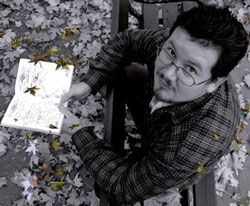
Our diaspora rose up after this winter. A few months ago I was in Warsaw for a week and was surprised by changes. Previously, I was not surprised by the active presence of Ukrainians on Polish streets. I could hear surzhyk (a macaronic blend of Ukrainian and Russian – Ed.), I could hear the proper Ukrainian language, I could hear the Russian language with a clear Ukrainian accent.
In April, I heard Belarusian and Russian with a Belarusian accent. The same in Vilnius, the same in Berlin, and the same, I think, in Ukraine, because some of the protesting Belarusians escaped to Kyiv and Lviv. Belarusians have become noticeable.
Now I will say politically incorrect things during a pandemic. One of the new bars in Warsaw is a Belarusian bar from the time of the new dry law (aka the lockdown – Ed.). It seems to be working only for take away, but somewhere behind the curtain, there are hidden Belarusian clients who go silent when you enter. It’s clear that when a person enters the territory of normalcy, for the first time they do not experience the fear of whether they will live free until the next day.
Yesterday, foreigners — other than close neighbors such as Ukrainians or Poles — used to ask “Where is Belarus?” They used to confuse us with Ukrainians. I was at many conferences and often was mistakenly presented as a Ukrainian. Now people are beginning to understand where, what, and how serious it is.
National spirit and the central myth of Belarusian history
B.B.: Indeed, your nation is almost non-existent in school textbooks and universities. And so I wanted to ask: We in Ukraine have the Cossack myth, the Centrepoint of our history, Cossack liberty, which is the essence of our national spirit. What is this Centrepoint for Belarus? This may be conjuring a stereotype, but I have to say that if you don’t come up with a stereotype for yourself, someone else will create it for you.
Paraphrasing Napoleon, who said that one who does not feed their historians will have to feed foreign ones: we also have our golden age, and this is the Grand Duchy of Lithuania, where Belarusians, or those who are now called Belarusians — then called differently — were an important part.
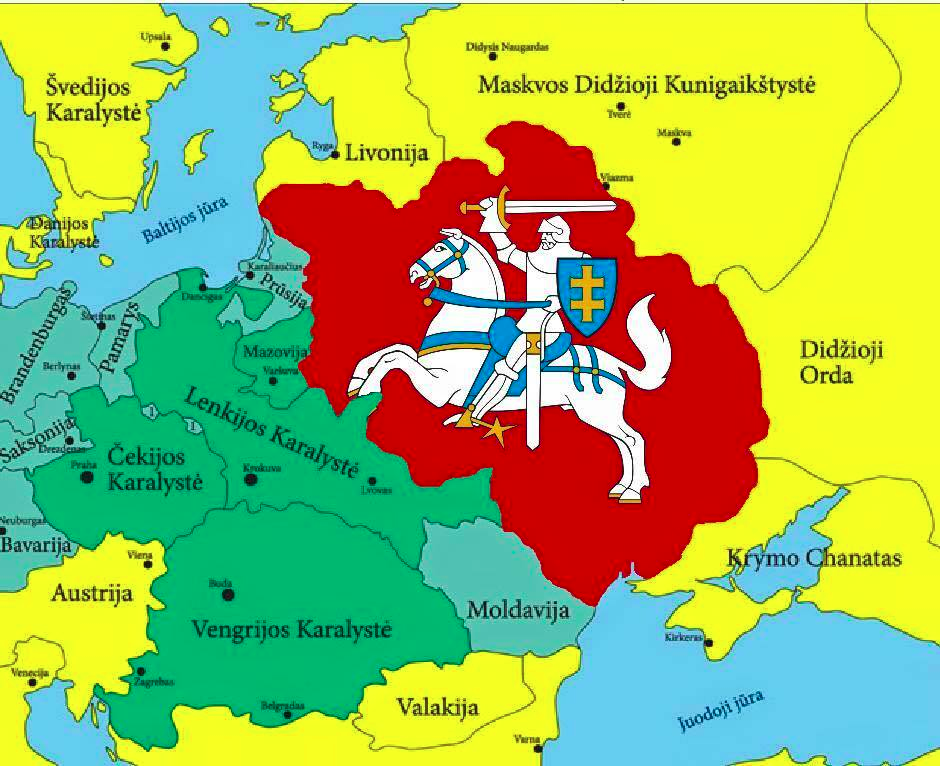
Then the language of the ruling elite, the language of literature and the language of legal documents, such as the Statute of the Grand Duchy of Lithuania, was a language that can be called with a certain approximation Old Belarusian. Although I think that Ukrainians also see a certain role in the history of the Grand Duchy of Lithuania
Once a Ukrainian friend, the writer Anatoliy Dnistrovyi, presented me with your thick anthology of Ukrainian baroque poetry. I noticed that half of the authors are our joint authors. Someone was born on the territory of modern Ukraine and died in Belarus; someone, on the contrary, was born in Belarus and died in Ukraine. Or somebody was born and died in Ukraine, but taught all his life in Belarus. It is impossible to divide.
But coming back to the Grand Duchy of Lithuania. It was a state in which several nations coexisted. It so happened that modern Lithuanian historians were more active and interpreted their legacy when it came to the international image. And Belarusians seem to find themselves as homeless orphans. Although for an earnest Belarusian it is clear that the Grand Duchy of Lithuania is home.For an interested Belarusian, it is clear that the Grand Duchy of Lithuania is home.
Russification, Russian historical narrative and standard accusation of Nazism for active Belarusians
At first, there was also the era of Polotsk and some other principalities, which were the first cradle of Belarusian statehood. They began to rule independently from Kyiv (during the era of Kyivan Rus – Ed.). Then came the Grand Duchy of Lithuania, and then the union with Poland and the Polonization of the Belarusian elite. As a result, a strong Soviet narrative emerges that Belarusians are a peasant nation that has never been a subject of history, only ruled by one lord or another. Therefore, it’s not surprising that the average Belarusian did not think of themselves in national identities, but in religious ones.
An introduction to the White-Red-White flag of Belarus, and the Belarusian politics of memory
In the early 20th century, during the short, relatively quiet period of the Soviet state, there was a certain cultural revival, as well as a relatively liberal state where four languages were recognized as official: Belarusian, Russian, Polish, and Yiddish. But it’s clear that all this was destroyed by Stalin’s repressions and the Second World War. The closer to modern times, the more methods of Russification have tried to unify such a diverse Belarus into one Russian space.The closer to modern times, the more instruments of Russification were used to try to unify such a diverse Belarus into one Russian space.
Traces of this are still felt. We still have nostalgia for various Russian and Soviet customs. We still have young guys studying in the military, who are called Suvorovtsi (Comrades of Russian General Suvorov – Ed.).Children are still taught the Napoleonic War at school as having been their own war against others. And then it turns out that thousands of Belarusians died while fighting against thousands of other Belarusians who died and fought on the other side.
We seem to live by the myths of neighboring countries’ history. But dig deeper, and everyone is surprised that Suvorov fought against our ancestors, brutally suppressed anti-Russian uprisings in Belarus. Among the distant ancestors of each of us may be victims of Suvorov repressions. But still, boys in uniform go out and continue this narrative, like other narratives of the Russian Empire.
Children are still taught the Napoleonic War at school as having been their own war against others. They are taught the Russian Empire is their own, and the French and those who joined them are strangers. And then it turns out that the memorials to the victims of the war have table displays commemorating one army on one side and another on the other side. Just like one in the Brest region where my wife and I spend the summer. It turns out that thousands of Belarusians died while fighting against thousands of Belarusians who died and fought on the other side. Some were recruited into the Russian army, while the nobility believed that Napoleon would restore the statehood of the Commonwealth and the Grand Duchy of Lithuania.
And during World War II, Soviet myth also tried to erase everything that was anti-Soviet. All non-Soviet partizans were taboo, they were not mentioned. Belarusians who developed Belarusian culture during the Nazi occupation were unequivocally called collaborators.
National symbols of Belarus
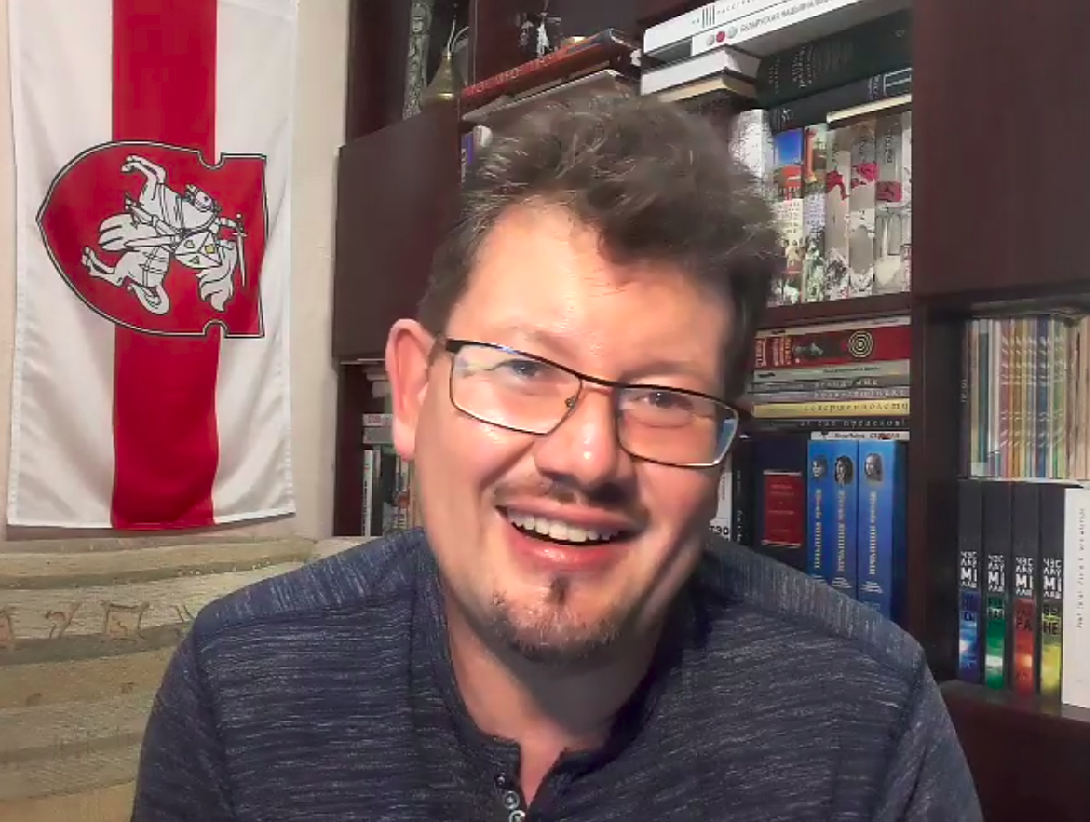
Behind me is our national flag, banned by Lukashenka. Again, state propaganda disgraces and discredits it as allegedly the flag under which “Germans hung people.” And the Soviet red flag for them does not seem to be the flag under which Stalin shot thousands. In fact, the colors of our flag and its Coat of Arms are the same as those of the Grand Duchy of Lithuania, albeit the horse’s tail is a bit different.
Why are protesters in Belarus using the white-red-white flag?
B.B.: It seems to me that the same propaganda is spread against your national motto Zhyve Belarus (Long Live Belarus), as allegedly a Nazi one.
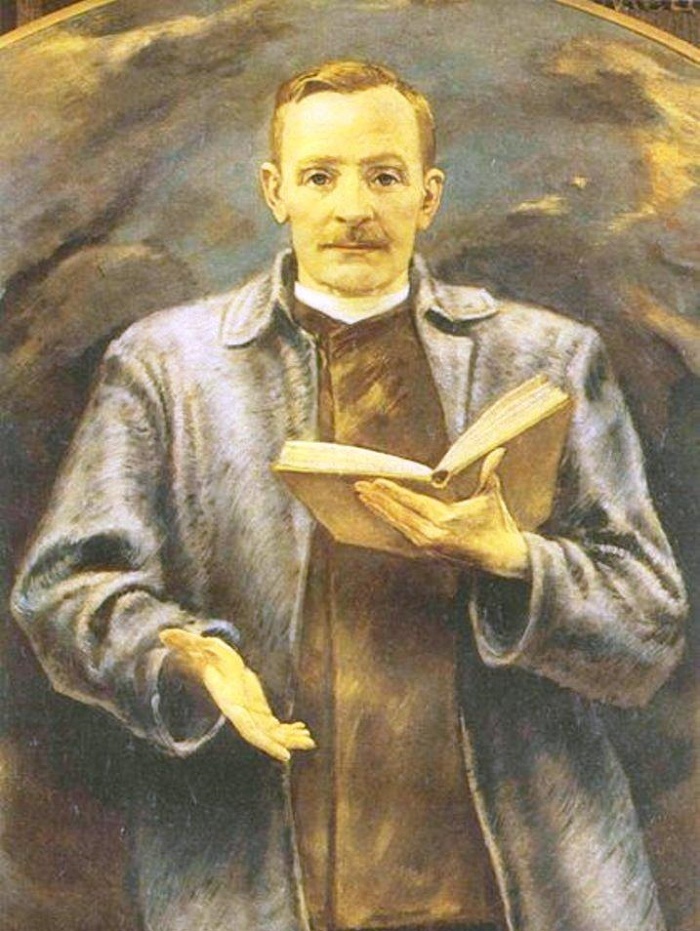
The government hated this slogan, because it was used by the opposition during the 1980s and 1990s, and 2000s, 2010s, and now 2020s. And if you dig deeper, it suddenly turns out that the Belarusian folk poet Yanka Kupala used this slogan in his poems and these poems are published in all textbooks and anthologies. But words are taken out of context and manipulated.
It’s worse about the anthem. During the short period of Belarusian independence from 1991 to 1994, when the Republic of Belarus was ruled by a parliament, the white and red flag and the coat of arms of the Grand Duchy of Lithuania became state symbols, but the anthem was not adopted then. It’s not very pleasant that some poets and composers competed with each other and depreciated existing proposals.
I think that the anthem of independent Belarus appears in the current protests. Suddenly it turned out that several songs touch all the strings of the soul, and one of these songs Pahonia is based on the words of Maxim Bogdanovich, and the second The God Almighty on the words of poet Natalia Arsennieva, and the third is a military song of the so-called Slutsk Armed Forces which was formed 100 years ago. It was an anti-Bolshevik uprising. One of the members, Makar Kravtsov, wrote a march We Will Come Out In Tight Rows. This is the most militant of these three songs. Our intellectuals paid attention to some words in this last one which symbolizes its urgency. There are such lines:
Хай воля вечна будзе з намі, А гвалту мы дамо адпор (“Khai volia viechna budze z nami, A gvaltu my damo adpor”, “Let the will be with us forever, and we will repel violence”)
Repel who? The enemy, occupier? Here we have the word gvalt — violence. We attempt to peacefully struggle against violence.
All these three songs were included in the repertoire of the Free Choir I mentioned which first sang during the lunch hours on the steps of the Philharmonic. Then the repressions began and it turned into a spontaneous flash mob.
Imagine that every day or several times a week it takes place in a crowded space. The musicians agree among themselves, and in some shopping center with an arch the musicians stand around the perimeter and suddenly begin to sing. People find themselves at the center of this choral singing. Someone listens in surprise, someone sings along, someone just stands and does not understand how to react to this. Then the repression by security officers began and affected cultural figures, and all this activity moved to the Internet. Now you can google a good Free Choir concert in good quality.
The God Almighty accompanied by the scenes of Belarusian protests: [embedyt] https://www.youtube.com/watch?v=Y53kb0k9mds[/embedyt]
What went wrong and why Lukashenka was elected in 1994
The reasons are partially demographic and historical. The Stalinist migration of peoples who did not simply come to Belarus plays a role. The ethnic composition has changed greatly. Moreover, cunning Soviet leaders liked to resettle all sorts of military personnel as insurance against the influence of their Western neighbors. In addition, in Soviet times, Belarus was a relatively highly developed region. There was industry, technicians, and a creative intelligentsia with a relatively good education. Therefore, anti-Soviet resistance was weaker than it was in Ukraine or in the Baltic states.
There was a paradox with Belarus: the collapse of the Soviet empire and the relative weakness of Yeltsin’s Russia led to Belarus being released too easily.There was a paradox with Belarus: the collapse of the Soviet empire and the relative weakness of Yeltsin’s Russia led to Belarus being released too easily.
Since all other republics declared independence, Belarus had nowhere to go. Fortunately, our pro-European liberal forces managed to declare independence. Fortunately. But for many people, it was not valuable. It was as if a gift had come undeservedly as a freebie.
Due to economic instability, many thought in this paradigm — you can choose either culture or a prosperous life. Some propagandists were asking the question: what do you want, the Belarusian language or sausages? And for some reason, it seemed to people that the use of the Belarusian language reduces the amount of sausages in stores. The rhetoric was like this: both the Belarusian language and culture are all good, but not now. Now we need to solve more fundamental material issues, we need to feed people.
In Belarus in 1994, the same thing happened as in post-revolutionary France from 1848 to 1851, when Napoleon III came to power. He was little-known and his only trump card was being a nephew of Napoleon Bonaparte. He came to power because people simply did not want any of the other politicians, because all the other politicians compromised themselves. I think Ukraine’s Zelenskyy is also a classic protest vote.
In Belarus, some politicians played on stereotypes and said: “You want patriots to come and discriminate against Jews and Russian-speakers.” The illusion was created that you will be forced to speak Belarusian at once. And people voted for the unknown Lukashenka and his populist anti-corruption slogans. This was the first and last time we had a fair presidential election. Later, as you know, no one counted the votes.

Russian and Belarusian languages
Lukashenka and his teammates are people of Soviet descent. Lukashenka had a complex of inferiority. What were the circumstances in villages in Soviet times? Belarusian-speaking parents sending a boy or a girl to the city, said: “Speak Russian, you will achieve more, you will make a career.” For Lukashenka, at that time Russian was the language of a career.
This first anti-Belarusian stereotype was multiplied by another — the Belarusian language in the 1980s was the language of the political opposition. Patriotic forces were very ironic about Lukashenka. He was ridiculed as an idiot for the few years he was a member of parliament, ridiculed for his rudeness. I think, as a vengeful man, he remembers the Belarusian language as the language of his enemies and opponents.
Meet the 73-year-old granny who became an icon of the protests against Lukashenka
Well, today, I think the strongest sphere of Belarusian existence is the language of young, creative, politically, culturally and in every way active people — the language of activists who care. And it also draws the regime’s hatred. It’s the language of cultural resistance, the language of rock ‘n’ roll singers singing the anti-regime protest song Zombie, it’s the language of artists who take to the streets, it’s the language of people who collect signatures and sign petitions, it’s the language of people who volunteer.Today, I think the strongest sphere of Belarusian existence is the language of young, creative, politically, culturally, and in every way active people — the language of activists who care.
Musical revolution
The most interesting things began last summer and then autumn. Pro-regime system organizations partially rebelled after people were beaten. Many state employees went to rallies. We even have a funny term – change your shoes, but change your shoes on the fly. Even more interesting was show business. Dozens of singers and bands that used to simply serve the regime suddenly started recording protest songs, either explicit or subtle.
Many call the Belarusian revolution musical. Perhaps that is why the regime, when understood, directed all possible repressions against street musicians. Dozens and dozens of groups were arrested for 10, 15, 25 days — just for performing on the street with musical instruments in front of people. There were no flags, no words of protest, there could be a completely neutral song, like a cover of Hallelujah. I saw how my colleagues were arrested while singing songs translated by me, which further struck me.Dozens of groups were arrested just for performing on the street with musical instruments. There were no flags, no words of protest
The fates of detainees and first victims
B.B.: Almost every week I see news like “200 people arrested in Belarus.” What happens to them later? Do they come back from prisons and how many places are actually left in Belarusian prisons?
Well, it’s a kind of a carousel, such an attraction. Most of those people are later released. However, they don’t return home as they were. Everything in prison is made for pressure, mental and physical. Unsanitary conditions. We all have a conspiracy suspicion that the system is intentionally making the maximum number of arrested people infected with the coronavirus. Every second person coming out of prison is sick and doesn’t recover for a long time. The cells intended for eight people are packed with 24, and then the virus does its job. It is clear that this system is now becoming more brutal.
A few days ago, political activist Vitold Ashurok died in Shklov Prison. The official version is cardiac arrest. It turns out that Ashurok’s letter from prison was widely circulated by journalists. He wrote:
“We, political prisoners, began to be marked in the colony with specially designed yellow ribbons.”
Do you understand what epoch it reflects and what associations it evokes? This, of course, caused a flurry of protests, conversations, and reposts. Just a few days after the letter, his heart stopped. This was a man only a few years older than me, he was 50, and he was in good shape. Of course, I can’t prove anything, but I think about it in a bad way. A strong statement about those political ribbons and a cardiac arrest.
The arrest of independent blogger Roman Protasevich is simply beyond good and evil, which speaks of the utterly irrational vengeance of a particular stupid “Uncle” at the head of a regime. Alert fighter jets, take hostages, change the route and force a passenger plane to land at the Minsk airport.
No, Belarusian dissident Protasevich is not a neo-Nazi. But the Kremlin sure wants you to think so
About the proper answer of the West to Lukashenka’s actions
The only thing I would add here is that you have to think very well about the answer. It’s easy to do as the European populists have already said – just block the Belarusian airlines and they will not fly. Of course, the Belarusian regime will block Western airlines in response, and an iron curtain will simply be created around Belarus, as in Soviet times.The Belarusian regime will block Western airlines in response, and an iron curtain will simply be created around Belarus. Is this what the Belarusians expect?
Is this what the Belarusians expect today? They are divided on the principle of parents abroad – children here, or children abroad – parents here. Some have left and hope to maintain contact with home at least occasionally. It seems to me that this will be a tough step that will strike not so much at authorities as at ordinary people. But of course, it is worth thinking about various sanctions.
I will add that we already have a common trigger with you – your trigger since 2014. This is when influential politicians in the West say, “We are deeply concerned.” The Ukrainian poet from Lviv and my friend Halka Kruk wrote:We want to shout at the outrage because of the inadequacy of this rhetoric.
“Ukrainians are concerned so deeply that they are already dead.”
Now all this applies to Belarus. We want to shout at the outrage because of the inadequacy of this rhetoric.
World must respond as strongly as possible to “Belarusian Milošević” – Ukrainian NGOs
B.B.: What else would you recommend Ukraine and the West do besides sanctions?
Well, first of all, to support all activists who can no longer be on the territory of Belarus — all victims, or those who are threatened. I understand that this is a shaky criterion and we need to deal with every case — but a lot is already being done. In Poland, for example, there has been a program since 2006 under which Polish universities support Belarusian students expelled for their political views. Such things can also be extended to academic staff who have been affected. In general – to help with the employment of adults who have to leave.
But, of course, I would not like to bend the stick too far so that the whole of Belarus leaves Belarus. Then there will be no change because the critical mass must stay.
What Khadanovich encourages to learn about Belarus
I mentioned the Free Choir today. You can see what it recorded. Further, we have an entire drama theater named after Yanka Kupala that rebelled against the regime and was disbanded for it. But the actors and directors created the YouTube channel Free Kupalovtsy. They broadcast something between a play and a movie, and it’s open access.
And look at how we look in one direction. The latest book of famous Ukrainian writer Serhiy Zhadan focused on Brecht’s translations, which are very relevant. The Kupala Theater premiered Brecht’s play Fear a month ago. The play is based on Nazi Germany, but it’s simply about Belarus in 2020-21, and it seems to me that these emotions are not alien to any Ukrainian. Also, Ukrainian PEN is about to publish a collection of interviews and works of ten Belarusian writers. Ten Belarusian writers in one book. But with books, it seems to me that there are so few translations that all of the few that are translated are worth reading.
B.B.: Thank you, it was very interesting for me. I can’t wait for an opportunity to visit free Belarus.
Long Live Belarus, Glory to Ukraine!
B.B.: Glory to Heroes!
Read also:
- “A blatant North Korea in the center of Europe.” Belarusian refugees explain why it’s so difficult to beat the dictatorship
- World must respond as strongly as possible to “Belarusian Milošević” – Ukrainian NGOs
- No, Belarusian dissident Protasevich is not a neo-Nazi. But the Kremlin sure wants you to think so
- Why don’t Belarus protesters shun Russia?
- Belarus takes down top news portal, arrests employees amid mounting assault on free press
- The lessons of Euromaidan: why the Belarusian revolution is at a stalemate
- Strategic thinking and a fight for Belarusian democracy
- A crash course on the Belarusian 1918 attempt at independence
- An introduction to the White-Red-White flag of Belarus, and the Belarusian politics of memory
- Why are protesters in Belarus using the white-red-white flag?
- How Alyaksandr Lukashenka stole the Belarus presidential election




